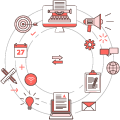Customer relationship management (CRM) is a process that helps enterprises manage their customer interactions. It involves gathering data about customers and using that information to improve customer relationships. CRM has become increasingly important in today’s competitive business landscape, where customer retention is vital for success. As a result, the demand for robust and effective CRM solutions has grown exponentially.
A good CRM system can help enterprises streamline their sales, marketing, and customer service processes while improving customer satisfaction and retention. But with an array of tools available in the market, how do you determine which is the perfect fit for your organization? Designed to help you navigate the complex world of customer relationship tools, this blog will explore the key distinctions between various CRM systems, their unique features, and the benefits they can bring to your business.
Operational CRM
Operational CRM is the process of using data from your sales and marketing platforms to improve your business operations. It can help you improve customer service, increase revenue and reduce costs. Operational CRM solutions aren't limited to automating manual processes. They're more about helping people make better decisions by providing them with actionable insights into their customer's needs and preferences at every step of their journey - from attracting new leads to closing deals.
Key Features
Sales Force Automation: This feature automates and streamlines sales processes. This feature helps sales teams manage and track leads and opportunities, prioritize sales efforts, forecast sales, and track the progress of deals in the pipeline. As a result, sales force automation can help businesses increase the efficiency of their sales teams, identify new opportunities, and close deals faster.
Marketing Automation: This powerful tool enables businesses to design personalized campaigns, segment target audiences, and track performance. Key features include email marketing, social media management, lead nurturing, and analytics. By automating repetitive tasks, marketing teams can focus on crafting tailored content that resonates with prospects and customers. Consequently, businesses can enhance customer engagement, drive conversions, and measure ROI effectively.
Customer Service Management: This feature includes tools for ticket management, knowledge management, and customer self-service. By using customer service management effectively, businesses can improve their customer support processes, provide faster and more efficient customer-support, and increase customer satisfaction. As a result, companies can easily manage customer support requests, provide relevant information to customers, and reduce response times, leading to improved customer retention and loyalty.
Benefits of Operational CRM
Improved Communication
- Streamlines internal collaboration
- Ensures consistent customer information across departments
- Facilitates better decision-making
Enhanced Customer Engagement
- Personalizes customer interactions
- Tracks customer preferences and behaviours
- Increases customer satisfaction and loyalty
Increased Efficiency
- Automates routine tasks
- Frees up resources for strategic initiatives
- Boosts overall productivity
Targeted Marketing Efforts
- Customizes marketing campaigns
- Identifies cross-selling and up-selling opportunities
- Optimizes return on marketing investment
Comprehensive Data Analysis
- Provides valuable insights into customer trends
- Helps identify areas for improvement
- Supports data-driven decision-making
Better Customer Service
- Centralizes customer information for easy access
- Reduces response times for inquiries
- Improves issue resolution rates
Higher Sales and Retention Rates
- Facilitates lead nurturing and management
- Increases repeat business
- Promotes long-term customer relationships
Scalability and Adaptability
- Supports business growth and expansion
- Integrates with other software and tools
- Adapts to changing market conditions and customer needs
Ideal Industries and Businesses for Operational CRM
Operational CRM is particularly well-suited for businesses that rely heavily on customer interactions, such as retail, hospitality, and healthcare industries. For example, a hotel or resort may use an operational CRM system to manage guest reservations, track customer preferences, and automate guest communications. Similarly, a healthcare provider may use functional CRM to manage patient appointments, track medical history, and automate patient communications.
Analytical CRM
Analytical CRM solutions use data-driven techniques and tools like data mining, predictive modelling, and artificial intelligence to analyze customer information and derive valuable insights. These solutions help organizations make informed decisions based on customer-centric insights and optimize customer interactions across various touchpoints. By identifying high-value segments and emerging market trends, businesses can capitalize on cross-selling or up-selling opportunities.
Key features
Data Collection and Analysis: Analytical CRM allows businesses to track customer interactions across various channels, such as social media, email, phone, and in-person visits. By analyzing this data, companies can gain insights into customer behaviours, preferences, and needs.
Customer Segmentation: Analytical CRM enables businesses to segment customers based on their behaviours, demographics, and other factors. Enterprises can create targeted marketing campaigns that appeal to specific customer groups, leading to higher engagement and sales. Customer segmentation also allows them to identify their most profitable customers and focus their efforts on retaining them.
Predictive Modeling: Another key feature of Analytical CRM is its ability to use predictive modelling to anticipate customer behaviours and preferences. By analyzing past behaviours and trends, businesses can create predictive models that forecast future customer actions. This helps companies to make data-driven decisions, such as creating personalized product recommendations, identifying cross-selling opportunities, and optimizing pricing strategies.
Benefits of Analytical CRM
Data-Driven Decision Making
- Provides insights from customer data
- Facilitates better business decisions
- Identifies trends and patterns
Customer Segmentation
- Groups customers based on behaviour and preferences
- Enhances targeted marketing strategies
- Improves customer retention and loyalty
Forecasting and Predictive Analytics
- Anticipates future customer needs
- Optimizes inventory management
- Guides sales and marketing efforts
Performance Measurement
- Tracks key performance indicators (KPIs)
- Monitors the effectiveness of marketing campaigns
- Assesses customer service quality
Enhanced Customer Profiling
- Creates detailed customer profiles
- Enables personalized communication and offerings
- Increases customer satisfaction
Market Analysis
- Identifies market trends and opportunities
- Supports competitor analysis
- Guides product and service development
Risk Management
- Detects potential issues early
- Mitigates risks related to customer churn
- Enhances overall business stability
Cross-Functional Collaboration
- Integrates data from various departments
- Fosters a data-driven culture
- Encourages teamwork and shared goals
Ideal industries and businesses for Analytical CRM
Analytical CRM is ideal for businesses that need insights from large volumes of customer data. It's beneficial for financial institutions, e-commerce, and healthcare providers. It helps analyze customer behaviour, identify trends, and make data-driven decisions. In finance, it allows tailored product offerings and better risk management. E-commerce businesses personalize marketing campaigns, leading to higher conversion rates and customer loyalty. In healthcare, providers analyze patient data to personalize treatment plans and identify potential health risks.
Collaborative CRM
Collaborative CRM solutions aim to improve the overall customer experience by managing interactions across multiple channels. They create a unified platform that captures and shares vital customer information across the organization, allowing teams to have a comprehensive view of the customer journey. By integrating communication channels like email, phone, and social media, organizations can respond promptly to customer inquiries, enhancing satisfaction and loyalty. These solutions also promote knowledge sharing among employees, empowering them to serve customers more effectively.
Key features
Communication Management: This feature allows for efficient communication between an organization and its partners. It helps to ensure that everyone involved in a project or business process is kept up-to-date with the latest information.
Partner Relationship Management: Collaborative CRM provides tools for managing and improving relationships with external partners, such as suppliers and vendors. This feature helps to ensure that the organization and its partners are working together efficiently and effectively.
Knowledge Sharing: Collaborative CRM also enables knowledge sharing among partners. This feature allows for exchanging information and ideas, leading to improved decision-making and better business outcomes.
Benefits of Collaborative CRM
Streamlined Communication
- Enhances interdepartmental collaboration
- Improves information sharing
- Reduces communication barriers
Unified Customer View
- Centralizes customer data from multiple sources
- Ensures accurate and up-to-date information
- Facilitates a 360-degree customer view
Better Customer Experience
- Enables personalized interactions
- Increases customer satisfaction
- Supports long-term customer relationships
Increased Sales Opportunities
- Leverages cross-functional expertise
- Identifies upselling and cross-selling potential
- Boosts overall revenue
Efficient Problem Solving
- Encourages collective issue resolution
- Reduces response times for customer inquiries
- Increases customer retention rates
Project Management Support
- Facilitates team coordination and planning
- Enhances resource allocation efficiency
- Supports the achievement of business goals
Knowledge Sharing
- Fosters a culture of learning and innovation
- Encourages best practice sharing
- Enhances overall business performance
Agile Adaptation
- Responds quickly to customer feedback
- Adjusts strategies based on real-time information
- Stays ahead of market trends and customer needs
Ideal Industries and Businesses for Collaborative CRM
Collaborative CRM focuses on seamless communication between departments and external partners. In manufacturing, it streamlines communication, ensuring timely delivery and enhanced customer experience. For technology and software companies, it fosters efficient problem resolution and improved satisfaction. Real estate businesses see better client experiences and increased sales through the integration of agents, brokers, and property managers. Professional services, like consulting and law firms, benefit from shared information and expertise, resulting in effective client solutions and relationship management. Lastly, the education sector can utilize Collaborative CRM to coordinate efforts between administration, faculty, and support services, providing students with a high-quality educational experience.
Strategic CRM
Strategic CRM solutions focus on creating long-term value for businesses by implementing customer relationship management strategies. They analyze customer data to make informed decisions aligned with business objectives and customer-centric goals. The primary purpose is to strengthen customer relationships and enhance retention by understanding customer needs and preferences, allowing businesses to offer personalized services. Emphasizing customer loyalty and trust, strategic CRM solutions build long-term relationships through targeted loyalty programs and exceptional customer service. Additionally, these solutions identify potential opportunities and areas for improvement, enabling businesses to refine marketing strategies, optimize sales efforts, and enhance operational efficiency.
Key features
Customer-Centric Approach: The customer-centric approach is the cornerstone of Strategic CRM. This mindset requires businesses to closely examine and understand their customers' needs, preferences, and expectations. Then, by tailoring products and services to meet these requirements, companies can foster stronger relationships with their clients and stand out from competitors in the market.
Long-Term Relationship Building: Rather than viewing customers as one-time transactions, businesses should focus on nurturing ongoing connections by providing exceptional customer service and support. This commitment to long-term relationships leads to increased customer satisfaction and promotes positive word-of-mouth and repeat business.
Customer Loyalty Programs: By rewarding customers for their continued patronage, companies can incentivize them to remain loyal and engaged with the brand. Well-designed loyalty programs can include personalized discounts, exclusive offers, and other perks that make customers feel valued and appreciated.
Benefits of Strategic CRM
Targeted Marketing
- Focuses on high-value customer segments
- Improves marketing campaign effectiveness
- Maximizes return on investment (ROI)
Relationship Management
- Strengthens customer bonds
- Encourages repeat business
- Reduces customer churn
Resource Optimization
- Allocates resources effectively
- Prioritizes high-impact CRM initiatives
- Boosts organizational efficiency
Market Penetration and Expansion
- Identifies new market opportunities
- Supports product and service innovation
- Drives business growth
Continuous Improvement
- Monitors CRM performance metrics
- Encourages ongoing refinement of strategies
- Ensures long-term success and adaptability
Employee Empowerment
- Fosters a customer-focused culture
- Enhances employee engagement and satisfaction
- Improves overall service quality
Ideal Industries and Businesses for Strategic CRM
Financial institutions can use Strategic CRM to better understand customer preferences and tailor product offerings, making them more likely to stay loyal. Telecommunications companies can identify pain points to improve customer satisfaction, which often results in increased revenue. For retail businesses, CRM can segment audiences and create personalized campaigns to make customers feel valued, and this can lead to more repeat business. Healthcare providers can use strategic CRM to better understand patients' needs and concerns, which can result in higher levels of satisfaction and trust. Lastly, travel and hospitality businesses can use CRM to identify customer preferences and deliver tailored services that create unforgettable experiences, resulting in happy and loyal customers.
Factors to consider when choosing a CRM solution
Business Size and Industry
A small business might need some basic features only and is unlikely to need complex functionalities. On the other hand, a large company with multiple departments may need modules for marketing, sales, customer service and internal operations like training and recruitment, among others. These factors will help determine the specific features and functionalities you require from the CRM software, as well as the budget you will need to allocate for it.
Moreover, different industries may have unique requirements for their customer relationship management processes. For instance, businesses in the retail or hospitality sector may require CRM software that can handle large volumes of customer data, track purchasing behaviour, and manage loyalty programs. Meanwhile, a law firm or accounting office may prioritize features such as client case management, billing and invoicing, and document management.
Specific Needs and Goals
Before choosing an appropriate CRM solution, you must thoroughly understand your specific needs and goals. The first step is to figure out what type of business you want to run and how much time you want to devote to it. Once you have an idea of where your business is headed, you can find a CRM that fits your needs. For instance, if your business is small and strictly online, there's no need to waste money on expensive software that includes features like call centre capabilities and large customer databases. On the other hand, if your business is large enough that customer service representatives must interact with each other to serve customers quickly, then perhaps it makes sense for you to invest in a higher-end system that offers multiple users at once.
Training Employees
You should also consider how much time and money you want to spend training employees to use the new system. If you have in-house resources available, you may be able to handle the training internally. However, if this is not feasible, hiring an outside consultant may be necessary. This can be an additional expense, but it may be worth the investment if it means getting the most out of your CRM system.
Integration with Existing Systems
A CRM system is only as good as the data it contains. If your team is already using Salesforce, Microsoft Dynamics 365, or another platform to manage sales information, then you want to make sure that your new CRM can talk to those systems. In addition, if you need to integrate with other third-party applications or software platforms, such as accounting software or email marketing tools like HubSpot, these integrations must work smoothly and efficiently. You don't want two separate systems that don't communicate with each other — it will just create more work for everyone involved.
Cost of Implementation and Maintenance
Many companies choose a CRM solution based on its features alone but don’t consider how much it will cost to install and run the system once it’s up and running. As such, they end up with high costs after they start using the software. If you don’t have an IT department capable of managing your new CRM system, make sure that any vendor you choose offers support services for installation and maintenance purposes. This will help ensure that your investment is protected over time and allow you to focus on growing your business rather than staying up at night worrying about who will fix the latest bug in your new software!



















 Website Designing Company In Delhi
Website Designing Company In Delhi  Php Web Development
Php Web Development  Website Development In Gurgaon
Website Development In Gurgaon  Website Development In India
Website Development In India  Free Website Analysis
Free Website Analysis  Website Development in Ahmedabad
Website Development in Ahmedabad  Website Development in Kolkata
Website Development in Kolkata  Website Development In Jaipur
Website Development In Jaipur 




